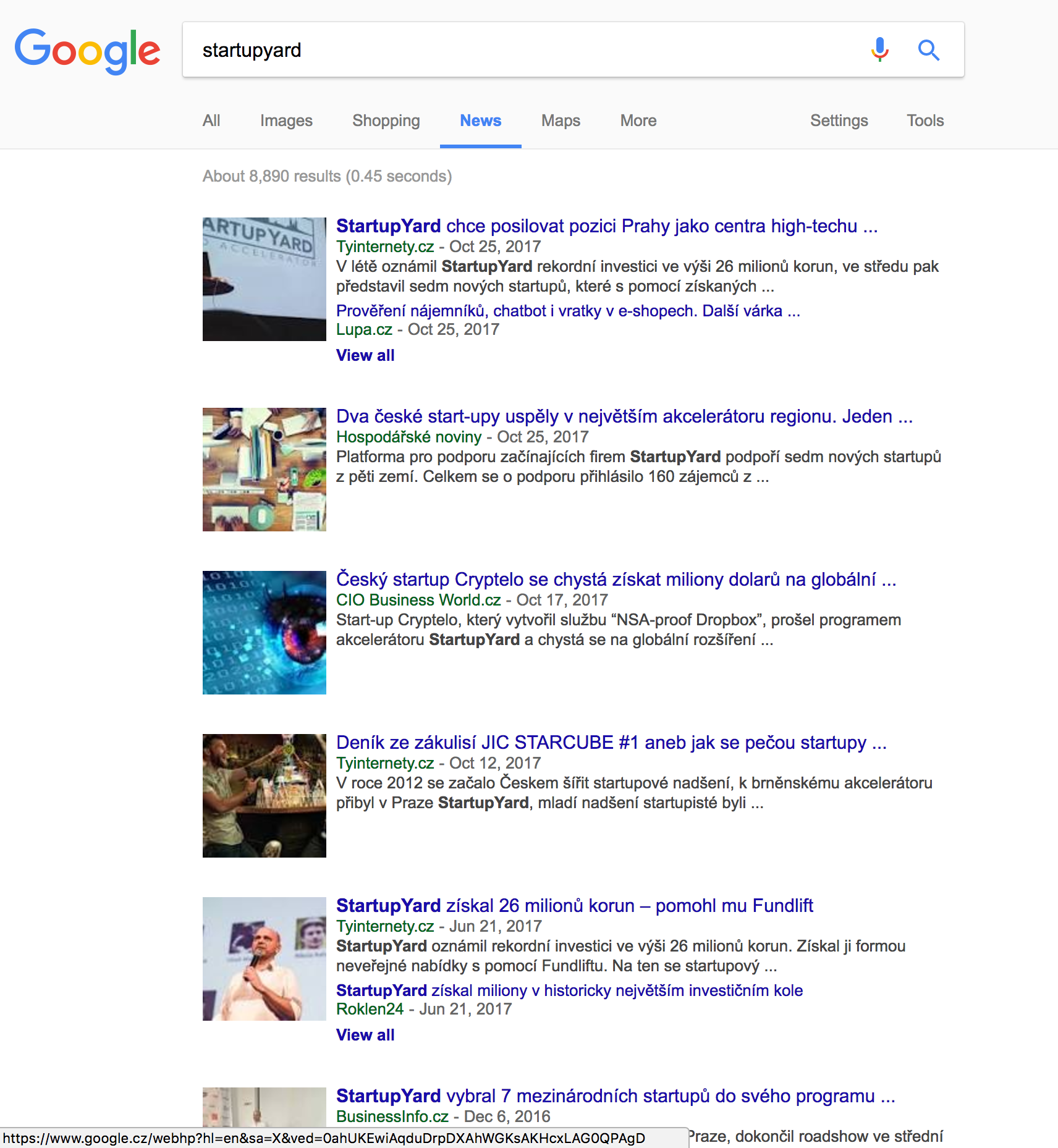How Should Startups Talk to the Press?
How should startups talk to the press? So you’ve launched your startup. Now the hard work starts. This week, we happily announced 7 new startups at StartupYard, and they all got a chance to meet the press. Over the past 2 days, numerous articles have appeared about them in the Czech press.

Here are the top hits for StartupYard in Google News (they are only a few of the articles published)- note the variety of headlines
How Smart Startups Talk to the Press: Be Prepared
So how did they do it? Despite the way movies make press conferences appear spontaneous and easy, they are actually carefully staged events. The press pitch, or the act of approaching the press with an idea for a story, is also a staged process.
Particularly when it comes to startups, it’s usually the founders who need to generate interest in the story. Journalists aren’t knocking down our doors, and few small companies get press they don’t earn.
Old fashioned preparation works today, just as it did 50 years ago. Take heart though: today, being prepared is easier than ever.
How to Prepare
We use a kind of refrain at StartupYard when it comes to press. It is: “make the press’s job as easy as possible.”
While no good journalist is lazy, all good journalists have too much to do. Making life easier doesn’t mean spoonfeeding them PR, but it does mean doing the boring stuff yourself.
A journalist has a reputation to protect (hopefully a good one). So you need to help them feel at ease. Certainly, if you don’t appear prepared, a journalist isn’t going to take a risk writing about you.
Here’s what you can prepare for a journalist before bugging them to write a story about you or what you are doing:
- A Press Packet (PDF, Dropbox Folder, etc)
- Photos of the team
- Screenshots or shots of the product in use
- Company one sheet, with Company history
- Financial and user data if needed
- Testimonials if you have them
- Contact details and bio of team members
- A Press Release with the Story
- Properly formatted
- Well written and objective (not a sales pitch)
- The product: Website URL and credentials if needed to test a product
- Pick the right target
- Someone who has written about you or your industry.
- Someone you have a personal/professional connection to
- Someone whose writing you like
- Someone at a publication that matters to your audience
It’s possible a journalist won’t need all this stuff to write about you. They might also write about something slightly different than what you pitched them.
Still, it’s helpful for the sake of your own clarity and confidence to have all these items ready to deploy. You never know when someone will ask for them. And if they do, it might be because they want to write about you.
Know Your Audience
Remember, you’re trying to get a journalist to write about you. So it pays to research exactly what that journalist is interested in, and what info they usually like to cover.
Some famous tech journalists have even published explicit guides on how to pitch them a story.
Mike Butcher is one example of this. While I find his approach a bit extreme, and also very much focused on tech-industry journalism, many of his points are universal. If you can’t answer every question he mentions, you might not be ready to talk to the press.
Solve a Problem for the Journalist
In that same infamous cheat sheet, Butcher writes:
“The most solid pitches come when the startup relates what they do to a CURRENT news story of the day. For instance, say Apple just came out with a new kind of headphone, and your startup has a product relevant to music or headphones. THAT is when you should jump all over the media – while your story is current and you can get into the tail-wind of a hot story. Not 6 months later when we’ve all moved on and forgotten about headphones.”
There’s a reason this is right out in front. Remember that the journalist has a job, and it involves generating content their readers want. If they don’t get read, they lose their jobs.
In addition, if they don’t “break” stories, and become a trusted source of news, then their reputation never grows, and they don’t advance professionally.
So you need to approach members of the press as people who have their own needs. As such, how can you help them fulfill those needs?
Here are a few easy ways to do that:
Become a trusted source: Journalists from several publications regularly ping me for my opinion on various topics. Often I am not quoted or mentioned, but when I have a story I want the journalist to tell, then it’s likely he or she will at least listen to me. To be a trusted source, you have to give more than you get.
Give them Real News: Remember, the journalist’s reputation is built on their ability to be first, to be right, and to be read. So help them do that. If you have a tip, and it is ethical to share it, then choose a favorite journalist to talk to about it.
Remember Your Friends: The other day, I was on Twitter when I spotted this:
If I cover your startup's early funding or launch when literally no one gave a fuck, only courteous to give me a heads up for future news.
— Steve O'Hear (@sohear) October 23, 2017
Steve O’Hear happens to be the journalist who wrote the “big story” about our alum Gjirafa, and its founder Mergim Cahani. Since I worked with Mergim to craft the press pitch that got Steve interested in the story, I immediately thought of him.
The good news is, Gjirafa didn’t forget Steve. But when some big news happens for them, they have to remember who was there from the beginning. Journalists take risks on startups all the time. Make it worth their while, and show some loyalty.
Plus, what’s better than Steve O’Hear getting to boast that he broke the story about Gjirafa 2 years before they “made it big,” and he gets to report that he was right all along? That’s a win win. Your best press is the press that loves you.
Make It About the Story. Not About You.
Remember, you are not entitled to a story just because you are a startup. My mother can start a startup. Anyone can. Tech journalists hear about new startups all day, every day.
If you want a journalist to take you seriously, then you need to have a real story. Real news.
Hint: you being a startup isn’t news. You launching a product is *probably* not news. Because who are you anyway?
So what is news?
Real news has a narrative. It connects with what’s going on in the world and where you are. There are other ways to describe it, but It’s simple to think of it like this:
- Controversy: What about the story is controversial or unexpected? What is challenging or new, or possibly unexplored or counter-intuitive?
- Trends: How does the story reinforce a trend that the journalist can describe and the audience can recognize? How does it “fit in” with other things that are in the news?
- Data: What are the facts? Why are those facts significant?
A press pitch that isn’t developing one of those things isn’t doing its job. Why tell your company history? Because it is part of a trend, or a controversial approach or point of view. Why are you doing what you’re doing? Because data shows that it matters. Everything is connected with advancing a controversial idea, a broader trend, and real data.
Keep in mind: You are not the story. You are *part* of the story. An important part, but not the only one.
Your Press Release
How do you deliver that story? There are many methods, but one of the most straightforward is with a classic press release.
We won’t dive into that here, but I will refer you to my authority on this topic: Colette Ballou from Ballou PR, a friend of StartupYard.
Her presentation on PR for Startups gives detailed instructions on how to craft and format a press release. It’s worth studying closely.
What is News?
Because this point is where many startups fail, I’m going to pay special attention to talking about what *is* and *isn’t* news.
I’ve prepared a handy list:
Not News:
- We launched a Startup!
- We pivoted our Startup!
- Our startup is better than another Startup!
- We have a (generic) opinion on something!
- We have a (vanilla) mission statement!
Is News:
- A famous person endorsed our product! (Proximity)
- A famous company uses our product! (Credibility)
- Our product solves a problem everyone is talking about! (Timeliness)
- We are experts on a hot topic and have an opinion! (Authority)
- We raised Money! (Relevance)
- We have a controversial mission statement! (Controversy, Sensationalism)
Get Professional Help
I know. You’re a rockstar. Everyone will want a piece of you.
I’ll let you in on a little secret though: rockstars have PR reps too.
You’re a small company, and your authenticity is vital. Still, using a PR pro can really help you develop your approach to press and connections you’ll need to get your story heard.
People see PR as a dirty word. It’s fake, or insincere. But that’s not necessarily the case. A good PR rep that understands and cares about what you do can be magic.
Think of it like this: you help your customers the way you know how. A PR rep helps the press the way they know how. The best marketing and PR isn’t dishonest, it’s mutually beneficial. It helps good stories get told by the right people. You don’t pay PR reps to lie. You pay them to find someone who cares.
StartupYard uses a PR agency. That’s how we get our startups covered in the press. Not because we can’t tell our story, but because we can’t spend all our time on relationships in the press. If you have a good agency, the press will trust them, and work with them. They can bring you credibility, and hopefully help you tell your story better.
With all that said: go forth and tell your story. Just do the footwork too.




